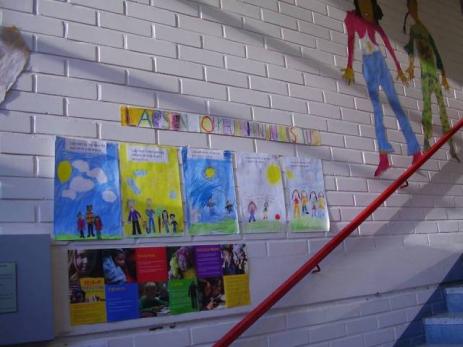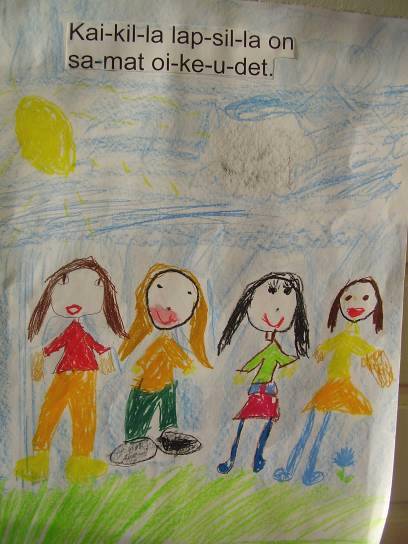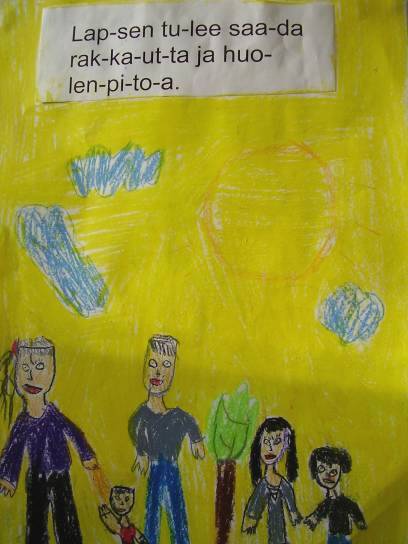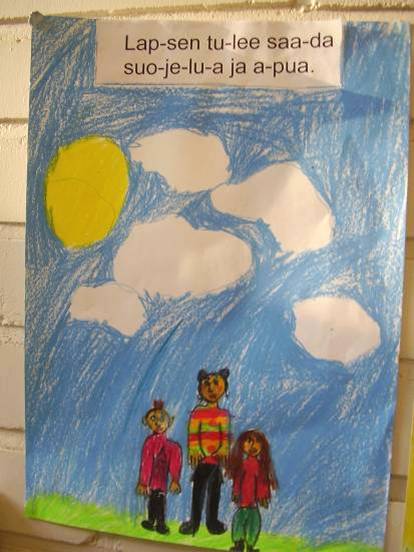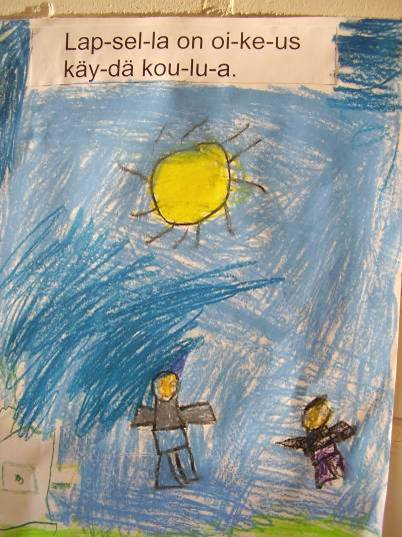The Declaration of the Rights of Children - Comenius 08/09
Principle 1 Every child, without any exception whatsoever, shall be entitled to these rights.
Principle 2 The child shall enjoy special protection, to enable him to develop physically, mentally, morally, spiritually and socially in a healthy and normal manner and in conditions of freedom and dignity.
Principle 3 The child shall be entitled from his birth to a name and a nationality.
Principle 4 The child shall enjoy the benefits of social security. The child shall have the right to adequate nutrition, housing, recreation and medical services.
Principle 5 The child who is physically, mentally or socially handicapped shall be given the special treatment, education and care required by his particular condition.
Principle 2 The child shall enjoy special protection, to enable him to develop physically, mentally, morally, spiritually and socially in a healthy and normal manner and in conditions of freedom and dignity.
Principle 3 The child shall be entitled from his birth to a name and a nationality.
Principle 4 The child shall enjoy the benefits of social security. The child shall have the right to adequate nutrition, housing, recreation and medical services.
Principle 5 The child who is physically, mentally or socially handicapped shall be given the special treatment, education and care required by his particular condition.
The Declaration of the Rights of Children
Principle 6 The child, for the full and harmonious development of his personality, needs love and understanding. He shall, wherever possible, grow up in the care and under the responsibility of his parents, and, in any case, in an atmosphere of affection and of moral and material security.
Principle 7 The child is entitled to receive education, which shall be free and compulsory, at least in the elementary stages. The child shall have full opportunity for play and recreation, which should be directed to the same purposes as education; society and the public authorities shall endeavour to promote the enjoyment of this right.
Principle 8 The child shall in all circumstances be among the first to receive protection and relief.
Principle 9 The child shall be protected against all forms of neglect, cruelty and exploitation. He shall not be the subject of traffic, in any form.
The child shall not be admitted to employment before an appropriate minimum age.
Principle 10 The child shall be protected from practices which may foster racial, religious and any other form of discrimination. He shall be brought up in a spirit of understanding, tolerance, friendship among peoples, peace and universal brotherhood, and in full consciousness that his energy and talents should be devoted to the service of his fellow men.
http://www.unhchr.ch/html/menu3/b/25.htm
Principle 7 The child is entitled to receive education, which shall be free and compulsory, at least in the elementary stages. The child shall have full opportunity for play and recreation, which should be directed to the same purposes as education; society and the public authorities shall endeavour to promote the enjoyment of this right.
Principle 8 The child shall in all circumstances be among the first to receive protection and relief.
Principle 9 The child shall be protected against all forms of neglect, cruelty and exploitation. He shall not be the subject of traffic, in any form.
The child shall not be admitted to employment before an appropriate minimum age.
Principle 10 The child shall be protected from practices which may foster racial, religious and any other form of discrimination. He shall be brought up in a spirit of understanding, tolerance, friendship among peoples, peace and universal brotherhood, and in full consciousness that his energy and talents should be devoted to the service of his fellow men.
http://www.unhchr.ch/html/menu3/b/25.htm
The situation in Finland
The situation with childrens rights is mostly good in Finland.
- Specialized health care for children and pregnant women.
- Free education
- Free, healthy lunches in school
- Forbidden to use any kind of fysical punishments either at school or at home.
- Specialized health care for children and pregnant women.
- Free education
- Free, healthy lunches in school
- Forbidden to use any kind of fysical punishments either at school or at home.
Points that should be improwed:
- Some children spend too much time without the security of adults. Either alone or with company of other too small children.
- - For example before or after school.
- This can cause the child to grow up to meet the ”world of adults” too soon.
- Some children spend too much time without the security of adults. Either alone or with company of other too small children.
- - For example before or after school.
- This can cause the child to grow up to meet the ”world of adults” too soon.
- Even though the law in Finland forbids any kind of discrimination, it is hard to root it out of all individuals.
- For example parents can teach their racist opinions to their children. Teachers meet this sometimes at school and have a big responsibility to show an example of unconditional equality. (Principle 10)
- For example parents can teach their racist opinions to their children. Teachers meet this sometimes at school and have a big responsibility to show an example of unconditional equality. (Principle 10)
Plans to teach about human rights
- The Declaration of the rights of children shall be processed in classes in different ways depending on the age of the children.
- Memory game about children’s rights will be made in classes. The ready games will be sent to cooperation schools in Spain and Poland.
- Memory game about children’s rights will be made in classes. The ready games will be sent to cooperation schools in Spain and Poland.
Deklaracja Praw Dziecka (pl)
Prawa dziecka to specyficzna podmiotowo grupa praw człowieka . Regulacje w tej mierze znajdują się w prawie wewnętrznym państw oraz w prawie międzynarodowym. Początek dała im Deklaracja Praw Dziecka z 1959.
Podkreśla się, że dzieci, stanowiące jedną z najsłabszych grup społecznych, podlegające z natury rzeczy władzy, decyzjom dorosłych, narażone na najpoważniejsze niebezpieczeństwo, muszą być chronione w sposób szczególny. Kontrowersje natomiast budzą kwestie wynikające z obyczajowości, tradycji religijnej i kulturalnej obowiązującej w niektórych krajach. Wiążą się one np. z zakresem niezależności dziecka od rodziców bądź opiekunów, jego prawa do samodzielnych decyzji, poglądów, wyborów, ochrony tajemnicy korespondencji, życia prywatnego i nietykalności cielesnej.
Deklaracja Praw Dziecka, dokument przyjęty 20 listopada 1959 przez Zgromadzenie Ogólne ONZ. Zawiera 10 szczegółowo sprecyzowanych zasad praw dziecka:
1. Powszechność zastosowania deklaracji - Deklaracja Praw Dziecka obejmuje wszystkie dzieci bez względu na różnice.
2. Otoczenie dziecka szczególną ochroną, która umożliwi jego wszechstronny rozwój w warunkach wolności i godności, czemu powinny służyć: ustawodawstwo kraju i wszelkie inne środki.
3. Prawo do nazwiska i obywatelstwa w chwili urodzin.
4. Stworzenie matce i dziecku przed i po urodzeniu warunków do rozwoju, opieki, ochrony medycznej poprzez system ubezpieczeń.
5. Szczególna troska wobec dzieci upośledzonych fizycznie lub umysłowo.
6. Stwarzanie dziecku atmosfery pełnej miłości, bezpieczeństwa i zrozumienia, czemu powinien służyć system ochrony rodziny, nieodrywanie małych dzieci od matki, poza krańcowymi sytuacjami, opieka nad dziećmi pozbawionymi rodziców.
7. Prawo do nauki, rozwoju kult., rozrywek, które powinny służyć pełnemu rozwojowi osobowości. Wymogiem minimalnym powinno być powszechne, obowiązkowe szkolnictwo na poziomie podstawowym.
8. Pierwszeństwo dziecka do ochrony i pomocy.
9. Ochrona dziecka przed wyzyskiem, okrucieństwem, zaniedbaniem, wykluczenie handlu dziećmi i zakaz pracy poniżej odpowiedniego, minimalnego wieku oraz wykonywania czynności szkodliwych fizycznie, psychicznie lub moralnie.
10. Wychowywanie dziecka w duchu tolerancji, szacunku dla innych ludzi, przyjaźni i pokoju między narodami.
Podkreśla się, że dzieci, stanowiące jedną z najsłabszych grup społecznych, podlegające z natury rzeczy władzy, decyzjom dorosłych, narażone na najpoważniejsze niebezpieczeństwo, muszą być chronione w sposób szczególny. Kontrowersje natomiast budzą kwestie wynikające z obyczajowości, tradycji religijnej i kulturalnej obowiązującej w niektórych krajach. Wiążą się one np. z zakresem niezależności dziecka od rodziców bądź opiekunów, jego prawa do samodzielnych decyzji, poglądów, wyborów, ochrony tajemnicy korespondencji, życia prywatnego i nietykalności cielesnej.
Deklaracja Praw Dziecka, dokument przyjęty 20 listopada 1959 przez Zgromadzenie Ogólne ONZ. Zawiera 10 szczegółowo sprecyzowanych zasad praw dziecka:
1. Powszechność zastosowania deklaracji - Deklaracja Praw Dziecka obejmuje wszystkie dzieci bez względu na różnice.
2. Otoczenie dziecka szczególną ochroną, która umożliwi jego wszechstronny rozwój w warunkach wolności i godności, czemu powinny służyć: ustawodawstwo kraju i wszelkie inne środki.
3. Prawo do nazwiska i obywatelstwa w chwili urodzin.
4. Stworzenie matce i dziecku przed i po urodzeniu warunków do rozwoju, opieki, ochrony medycznej poprzez system ubezpieczeń.
5. Szczególna troska wobec dzieci upośledzonych fizycznie lub umysłowo.
6. Stwarzanie dziecku atmosfery pełnej miłości, bezpieczeństwa i zrozumienia, czemu powinien służyć system ochrony rodziny, nieodrywanie małych dzieci od matki, poza krańcowymi sytuacjami, opieka nad dziećmi pozbawionymi rodziców.
7. Prawo do nauki, rozwoju kult., rozrywek, które powinny służyć pełnemu rozwojowi osobowości. Wymogiem minimalnym powinno być powszechne, obowiązkowe szkolnictwo na poziomie podstawowym.
8. Pierwszeństwo dziecka do ochrony i pomocy.
9. Ochrona dziecka przed wyzyskiem, okrucieństwem, zaniedbaniem, wykluczenie handlu dziećmi i zakaz pracy poniżej odpowiedniego, minimalnego wieku oraz wykonywania czynności szkodliwych fizycznie, psychicznie lub moralnie.
10. Wychowywanie dziecka w duchu tolerancji, szacunku dla innych ludzi, przyjaźni i pokoju między narodami.
